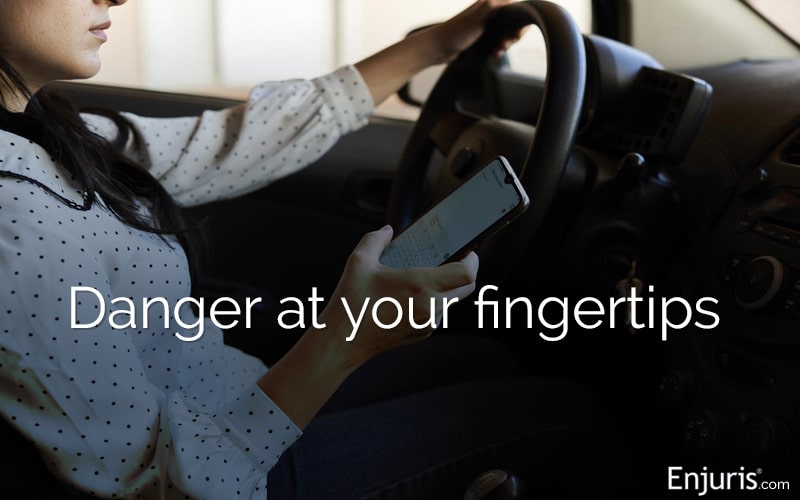
From penalties to personal injury compensation
Whether you’re the distracted driver or the victim of a distracted driving accident, understanding Nebraska’s laws can help.
It’s a beautiful day in Nebraska, and you’re driving down the picturesque Lincoln Highway. You’re taking in the vast plains when suddenly, a distracted driver swerves into your lane, causing a catastrophic car crash.
Distracted driving is a growing threat to driver safety in Nebraska. Fortunately, the state has established a number of laws and regulations aimed at curbing distracted driving.
In this article, we’ll take a look at Nebraska’s distracted driving laws, and we’ll provide some tips for how to recover damages following a distracted driving accident.
Understanding distracted driving
Before diving into Nebraska’s distracted driving laws, let’s take a moment to clarify what the term “distracted driving” encompasses.
According to the National Highway Traffic Safety Administration (NHTSA), distracted driving involves any activity that diverts attention from driving.
Common examples of distracted driving include:
- Texting
- Eating or drinking
- Talking to passengers
- Adjusting the stereo
Distracting activities tend to fall into one of three categories:
- Cognitive distractions take your mind off the road (for example, talking to a passenger).
- Visual distractions take your eyes off the road (for example, adjusting the stereo).
- Manual distractions take your hands off the wheel (for example, eating a snack).
Texting and driving falls into ALL THREE categories, which makes it particularly dangerous.
According to the World Health Organization, a driver using a mobile phone is four times more likely to be involved in a crash than a driver who is not using a phone.
How common is distracted driving in Nebraska?
Since 2010, distracted drivers in Nebraska have caused more than 40,000 crashes, 14,018 injuries, and 119 fatalities, according to the Nebraska Department of Transportation.
Still not convinced that distracted driving is a problem in Nebraska? Here are some additional statistics to consider:
- Distracted driving accounts for roughly 12 percent of all traffic crashes in Nebraska.
- Since 2010, distracted driving crashes have increased by 31.7 in Nebraska.
Nebraska’s distracted driving laws
Nebraska’s principal distracted driving law can be found in Nebraska Revised Statutes Section 60-6, 179.01. Under the statute:
All drivers are strictly prohibited from using a handheld wireless communication device to read, type, or send written communication while operating a motor vehicle.
Even though an extensive body of research underscores the risks associated with talking on a hands-free device while driving, Nebraska’s distracted driving law does not currently prohibit this practice.
Penalties for distracted driving in Nebraska
Nebraska’s distracted driving law is a secondary law, meaning an officer can only issue a ticket if the driver is pulled over for some other violation.
Any person who violates Nebraska’s distracted driving laws will be guilty of a traffic infraction. The driver will be assessed points on their license and will be fined:
- $200 for a first offense,
- $300 for a second offense, or
- $500 for a third and subsequent offense.
Distracted driving and personal injury cases
The fines for distracted driving in Nebraska are relatively minor. The real consequences arise when a distracted driver is involved in a car accident.
Under Nebraska law, a driver is negligent if they fail to use reasonable care and someone is harmed because of that failure.
When a driver causes a car accident because they were distracted (e.g., they were texting and driving or applying makeup while driving), the driver is negligent and responsible for paying the damages caused by the accident.
What if I’m partially at fault for the accident?
If you’re involved in an accident with a distracted driver, and you’re partially at fault for the accident, you can still recover damages.
Nebraska follows the Modified Comparative Fault Rule, also known as the 50% Rule. Under this rule, the plaintiff (injured person) must be 50 percent or less at fault in order to recover any damages. If that’s the case, the plaintiff may recover damages, but the damages are reduced according to the plaintiff’s percentage of fault.
Steps to take following a distracted driving accident
If you’ve been in a car accident, proving that the other driver was distracted at the time of the accident can go a long way in supporting your claim. Here are some steps you can take following an accident to accomplish this goal:
- Call emergency services (911). If you’re injured, your first priority should be your health. Remember, some symptoms don’t appear until hours or even days after an accident. For this reason, you should see a doctor immediately after your accident, even if you don’t think you were seriously injured.
- Tell the police. When the police arrive, be sure to tell them that you think the other driver was distracted. The responding officer can conduct an initial investigation and, if they find evidence that the driver was distracted, include this information in their police report.
- Gather information. Be sure to get the other driver’s contact information (their name, address, registration number, and license number). In addition, write down the contact information for any witnesses. Finally, take pictures of the scene, the damages, and anything else that’s relevant to the accident. If there’s any evidence that the driver was distracted (such as a half-eaten sandwich on the dashboard), take a picture of it.
- Contact an attorney. Proving that another driver was distracted can be challenging. Fortunately, experienced personal injury attorneys establish fault for a living. An attorney can subpoena cell phone records, review security footage, depose drivers and passengers, and take other steps to establish that the driver was distracted.
Distracted driving is a serious problem in Nebraska. If you’ve been injured in a distracted driving accident, understanding Nebraska’s laws is a good first step in receiving the compensation you deserve. But ultimately, there’s no replacement for an experienced personal injury attorney.
See our guide Choosing a personal injury attorney.
